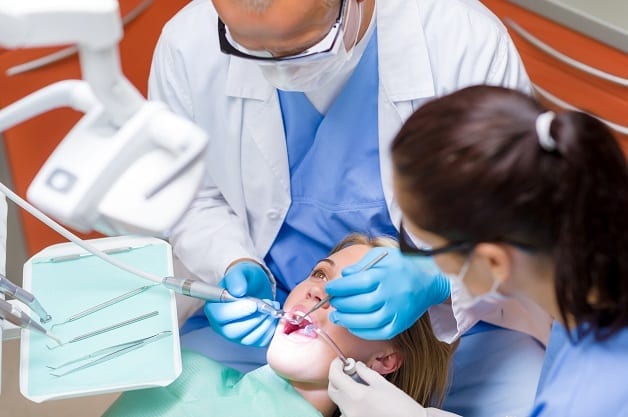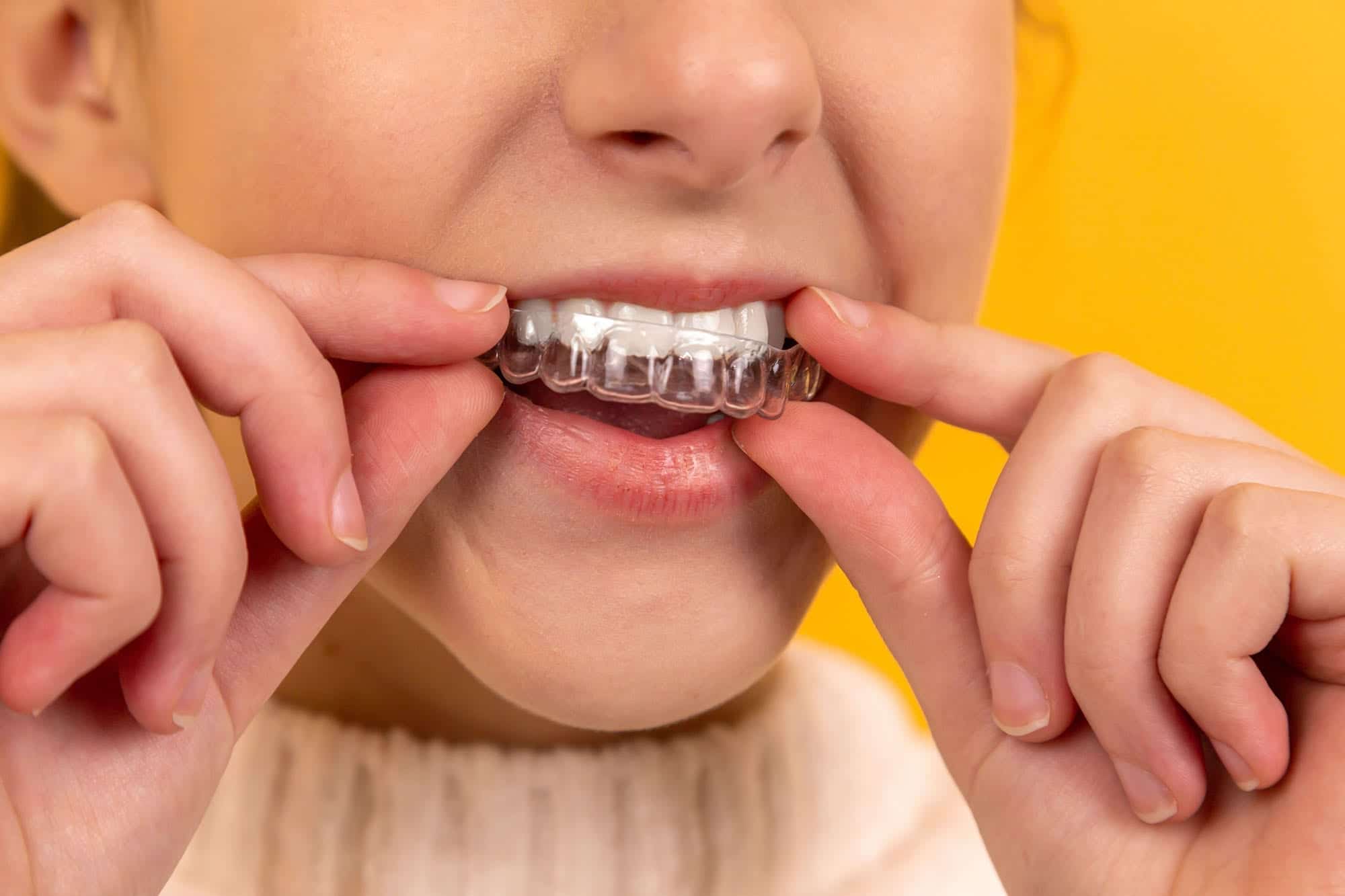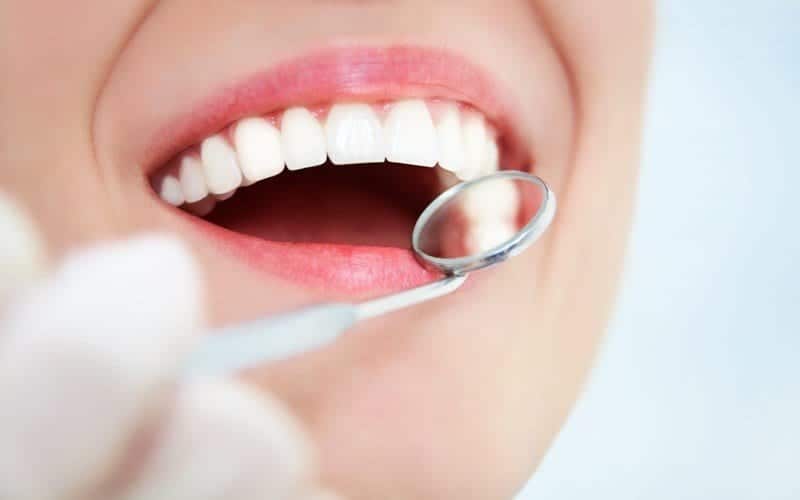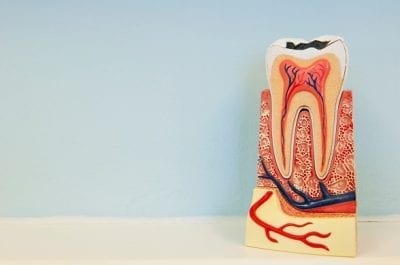Tooth cavities or dental caries are holes in your teeth caused by tooth decay, which in turn happens when specific bacteria types produce plaque acid that destroys the enamel of your teeth and its underlying dentin layer. The signs and symptoms of dental caries include pain when chewing, toothache, and tooth sensitivity to cold, hot, or sweet food and drinks.
Because cavities can penetrate into the tooth structure beyond the enamel and dentin, you may experience sensitivity to certain foods and drinks thanks to potential nerve exposure. Many bacteria types live in the mouth and build up on the teeth as dental plaque, which is a sticky yellow film of sorts. This film is the number one reason for your tooth decay issues.
Page Contents
A Closer Look at Tooth Decay
When your tooth enamel softens enough to the point of easy degradation and the formation of holes or cavities, then your tooth might be suffering from tooth decay. This term refers both to the process of decay of the tooth from the acids produced by bacteria in plaque as well as the damages cause to the structure of the tooth. The acids are formed from the bacteria breaking down sugar in your mouth. To wit:
- Don’t Leave Tooth Decay Untreated: You should prevent cavities from happening by eating the right food and observing proper dental cleaning habits regularly, If the mineral loss of the enamel is unaddressed then it can form a hole that will only get bigger and bigger in time. The holes can grow large enough to puncture through the dentin and expose the tooth root to bacterial infection.
- Why It’s a Bad Idea to Let Your Teeth Root Get Exposed: The pain associate with toothaches most come from exposed tooth roots with both the dentin and enamel eaten away by bacterial acid. The beginning stages of dental caries are actually painless and feature teeth that can still be saved through teeth filling. However, once the cavities become big enough to turn into root cavities, your may feel pain whenever you drink or eat.
- Attend Dental Services Early Instead of Later: Prevention, as the saying goes, is better than the cure. Or, at the very least, it’s a lot less expensive. Thusly, once you feel pain near the root of the tooth, then it’s usually too late and you have to probably call a dental professional to help fix, restore, extract, or surgically replace the tooth. You can avoid all these expenses by observing regular teeth cleaning and having the right diet. You should also attend dental appointments regularly.
- Taking Care of Your Teeth is Important: Preventing the dreaded dental cavity is essential because getting a dental implant or availing of a root canal procedure is prohibitively expensive. It eats away a huge chunk of your budget and what’s worse is that dental caries is more often than not preventable. Dental cavities come from neglecting to regularly remove the plaque from your teeth. It’s also a sign of poor hygiene and oral health.
- The Steps Required for Cavities to Form: In order for dental caries to occur, there are a number of things that need to happen. The initial step is the loss of tooth minerals from the enamel from plaque acids known as demineralization. Eventually, this will lead to dental caries or cavity formation. Tooth decay also happens when carbohydrate-rich food bits become stuck between teeth gaps and aren’t immediately removed with flossing and brushing.
Signs and Symptoms of Tooth Decay and Cavities

Cavity symptoms appear as your tooth decay worsens. If you notice any of the following symptoms of cavity formation, then consult your dentist ASAP. The earlier the symptoms are addressed the easier and quicker it is to treat the dental caries before you cross the point or threshold of no return.
Be in tune with the healthiness of your teeth and gums by being on the lookout for these symptoms:
- Pain: One of the most obvious and common symptoms of cavities is pain or a toothache.
- Pressure: Your tooth or teeth might have cavities if there’s increased tooth sensitivity and pain when you bite down.
- Pits: Cavities or caries have the most visual impact as noticeable pits or holes on the tooth enamel. Sometimes, the holes can only be seen by dental x-ray but that doesn’t make them any less risky.
- Pus: If your tooth has pus around it, then you have serious and advanced teeth cavities that may include a bacterial infection on the gums or the tooth root itself.
- Sensitive Teeth: If you’re eating some foods and beverages that are hot, cold, or sweet and then you suffer from pain, then you might have sensitive teeth and tooth decay.
These signs and symptoms of dental caries are usually linked with advanced tooth decay. They therefore need immediate treatment from your dentist as soon as you can get to his or her clinic.
Causes of Cavities and Tooth Decay
Eating sugary, sticky, and starchy foods and beverages can cause major tooth decay. The more sugar you consume, the more acid your plaque produces. Cut away the acid production by consuming less sugar and brushing your teeth more. You can also eat nature’s toothbrushes in the form of apples, carrots, and celery. Sugar feeds plaque and makes it produce acid that weakens the enamel it’s stuck on.
Your vulnerable tooth can then decay, forming holes and cracks all over it. Every time a sugary snack, drink, or dessert is consumed, your teeth become more vulnerable to damage due to its compromised enamel that’s deluged in acids for the next 20 minutes or so. You should understand what causes tooth decay and dental caries to learn how to better take care of your teeth when push comes to shove.
At any rate, the factors of cavity and tooth decay to watch out for include the following:
- Inadequate Oral Hygiene Habits: Plaque tends to build up if you don’t brush your teeth regularly, which then deluges your tooth in acid that directly attacks its enamel until cavities are formed.
- Formation of Plaque: Plaque or film is caused when saliva, food particles, acid, and bacteria combine in your mouth, forming a layer of material on the teeth themselves. Over time, this plaque will build up and attack the enamel with its acids from the bacteria feeding on sugars. This process will then cause holes to form on your teeth, also known as dental caries or cavities.
- Dry Mouth: Saliva production actually helps flush down harmful bacteria, plaque, and food bits from your mouth. In turn, cotton mouth or dry mouth with little to no spit can induce faster buildup of plaque.
- Eating and Drinking: You can’t avoid doing this since we need to drink and eat to live. However, you can prevent plaque formation from these two natural processes by eating right, avoiding sugary foods, eating fruits and vegetables like leafy greens and apples, consuming dairy products like yogurt and cheese, and observing proper hygiene. Cut down on dessert.
- Bacteria and Acid: You can’t avoid having bacteria in your mouth either. They simply naturally live in your mouth, so much so that even after you’ve killed 99.9% of them through mouthwash they’ll be teeming again soon after because of the food that you eat. Carbohydrates, in particular, are digested by these germs to produce their enamel-dissolving acid.
- Medical Problems: These issues can lead to tooth cavity. Any condition that causes acid from your oral bacteria or even acid from your stomach to flow back into your mouth can weaken teeth. For example, bulimia increases your tooth cavity risk simply by exposing your teeth to stomach acid every time the bulimic purges what he or she ate by vomiting.
Formation and Preventive Measures

Here’s a rundown on cavity formation and how to prevent them.
- Diagnosis: When examining your teeth surface, your dentist can end up diagnosing that you have cavity formation or the beginnings of one. He can look at the tooth or take an x-ray of your mouth to see if the cavity has reached from the enamel to the dentin or pulp. From there, he might recommend tooth filling, tooth extraction, the root canal procedure, or putting in a crown atop the compromised tooth.
- Prevention: There are multiple methods to go about preventing cavities. They’re all rooted from the fact that cavities are formed by plaque and eating sugary foods that can feed the plaque and cause them to produce waste products that leave you with halitosis or bad breath and plaque acid that melts a hole in your teeth if not dealt with properly. These ways include:
- Brush and Floss Your Teeth Daily: Brushing your teeth after every meal and flossing to get rid of the food stuck between teeth will help decrease the amount of plaque on your tooth as well as their exposure to enamel-damaging acids within your mouth.
- Eating Starchy and Sugary Foods: You should cut down on your consumption of sugary and starchy foods to assist the reduction of the amount of plaque acids in your mouth.
- Use Mouthwash: Use mouthwash or an antiseptic rinse in order to reduce the bacterial levels in your mouth. Although it won’t get rid of all the bacteria, the large population of bacteria it does kill is of great significance to your dental wellbeing.
- Use Fluoride Toothpaste: You should also use fluoride toothpaste in order to strengthen your teeth, particularly its enamel. You can also get in-clinic fluoride treatments by your dentist or take fluoride supplements also recommended by your dentist.
- Chew Gum: Don’t just chew any gum. You should avoid sugary gums that defeat the purpose of chewing gum for oral health. Instead get one that’s sugarless and contains xylitol, which actually decreases the growth of mouth bacteria.
Treatment of Cavities
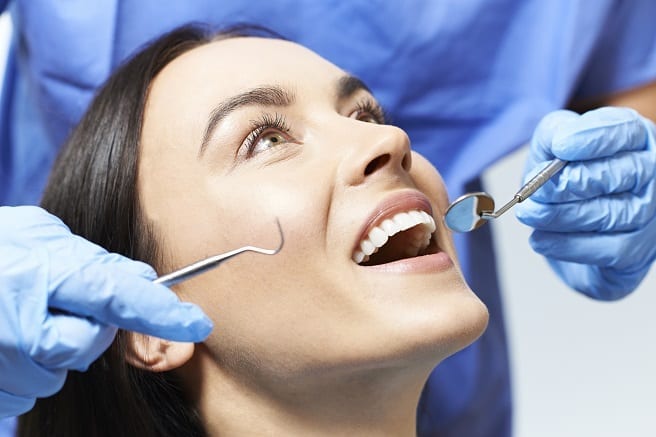
In children, dentists can seal or put fillings in baby and permanent molars. It’s kind of a waste to put in fillings for baby or milk teeth though since these teeth naturally fall off anyway to make way for permanent teeth. However, you can’t start too early when it comes to establishing proper dental habits. Your dentist can also apply fluoride varnish on your teeth to protect them from decay.
In adults, the application of sealants and fillings on molars is more important during the earliest signs of tooth decay because these molars are permanent teeth instead of milk teeth. Once they’re gone, you can’t put them back. You have to install expensive dentures or dental implants in order to restore your smile after suffering from tooth loss. Sealants are best put on teeth wherein the decay hasn’t broken through the enamel.
Cavity Complications
Once the dentin is exposed and the enamel has been irreversibly compromised, then your dentist will have to go through more extreme measures like a root canal procedure or putting in inert material on the hole. Root canal is called for in cases involving tooth root or nerve inflammation or infection that has spread through the root itself.
The cavity can only get worse once the enamel has been cracked or gotten a huge hole. Soon enough, uncontrolled decay might destroy or kill the tooth completely, necessitating extraction or replacement by dentures or false teeth. What’s more, an infected tooth root can also do a number on your health the same way it would with other infection types. You might need to take antibiotics to keep the infection from spreading further.
In a Nutshell
Cavities happen if you have poor oral hygiene and bad dental habits. The dental plaque your teeth surface has retained is mainly responsible for the degradation of your teeth because it contains specific bacteria that produce plaque acids that compromise your enamel. You need to brush away this film to ensure and maintain tooth health. This plaque can also be found in your gum line, which then causes gum diseases like gingivitis and periodontitis to occur. You’ll need a dental specialist like a periodontist to treat those types of conditions.
When you consume food and drink these germs then create acids capable of dissolving the protective layer of the teeth directly underneath the retained plaque. Left untreated, this can cause holes or cavities to appear on your teeth. Decay happens on the enamel or the outer hard covering of the teeth, with it breaking down all the way to the dentin layer. Eventually, it can reach the pulp or nerve of the tooth, causing severe pain when inflamed.
Thantakit International Dental Center is Thailand’s longest established dental center. Situated in Bangkok, our clinic is renowned across the world as a destination for world-class dentistry, with most of our patients flying to us from Australia.
Please contact us today and get a FREE dental consultation.



